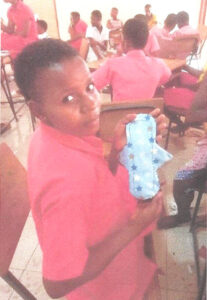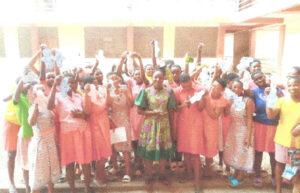UNDER CONSTRUCTION
Margaret Arnheim (Maaka e.V. Germany)
Sewing sanitary pads by Bulsa schoolgirls
Introduction by Franz Kröger
While on the political and economic level in Ghana the disadvantages of women have decreased in the last decades, for Bulsa and other Ghanaian schoolgirls, two natural, gender-specific problems remain:
1. A mostly unwanted pregnancy puts teenage pupils in great distress because their schooling is at least limited in time, and in most cases even cancelled altogether. Financial bottlenecks due to increased expenses for mother and child also affect the school career.
2. A temporary problem occurs with the monthly menstruations of teenage schoolgirls. Since many girls cannot afford to buy sanitary pads, they stay away from school on these days.
—
Maaka e.V, a Non Governmental Organization based in Germany, with Margaret Lariba Arnheim as the chairperson, organised a training sesssion on producing sanitary pads for women and students in Gbedema on May 2nd, 2024 and later, on 23 March, 2024 in Kanjarga for 37 final year girls in Kanjarga community day school. Training was totally free and training kits were provided for the trainees.
Goals and specific objectives of the project
The overall goal of the project is to strengthen the capacity of adolescent girls to manage their menstruation effectively and in a hygienic way through improved knowledge, attitude and access to affordable reusable sanitary menstrual materials.
In the training course the girls were instructed about the following activities and capabilities:
• sewing renewable sanitary pads by means of a provided training kit
• identifying available materials at home that can be used later for their own production of sanitary pads (e.g. towels, bedsheets, old T-shirts etc.)
• cleaning the used sanitary pads to save them for the next use.
Kaylacares 
The project was carried out by Kaylacares, a girls’ and women’s empowerment social enterprise (NGO), promoting menstrual and maternal hygiene management and aimed at providing a holistic Menstrual and Maternal Health Management (MMHM) solution.
It dedicated itself to the manufacturing of menstrual and maternal products, education and skills training to the most vulnerable areas of Ghana. It uses alternative eco-friendly and potentially healthier menstrual and maternal products which are sustainable, affordable and equitable for adolescent girls and women in fertility age to menstruate with dignity, comfort and in a hygienic manner. Therefore it may end what we call “period poverty”.
Conclusion
We strongly believe that these short trainings have given the girls and women from Gbedema and Kanjarga basic skills and knowledge about menstrual hygiene products and practical skills how to make reusable sanitary pads.

- Editors and Copyrights
- Two Sons of Buluk ordained in Wiaga to the Catholic Priesthood
- Bulsa schoolgirls sew sanitary pads
- Margaret Akanbang – The Mother of Doctors
- Animals, a Benefit for the Bulsa
- Events
- Elections 2024
- Joseph Aduedem: Gbanta Bogka – A Journey into Bulsa Divination Practices
- Obituaries
- Darius Adjong’s PhD thesis
- A German Anthropologist among the Bulsa: A Biographical Conversation
- POEMS
- MAIN FEATURE: BULUK OVER THE LAST HUNDRED YEARS